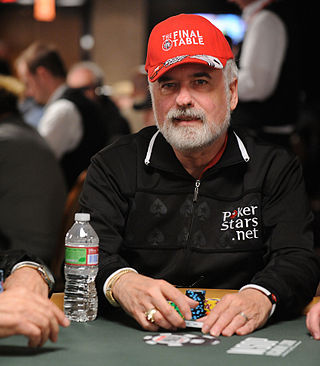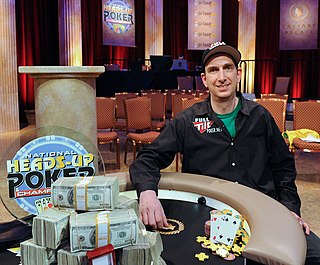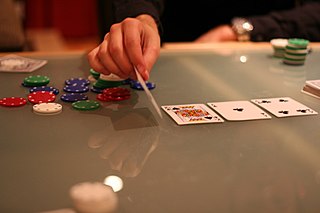Related Research Articles

Poker is a family of comparing card games in which players wager over which hand is best according to that specific game's rules. It is played worldwide, but in some places the rules may vary. While the earliest known form of the game was played with just 20 cards, today it is usually played with a standard deck, although in countries where short packs are common, it may be played with 32, 40 or 48 cards. Thus poker games vary in deck configuration, the number of cards in play, the number dealt face up or face down, and the number shared by all players, but all have rules that involve one or more rounds of betting.

Texas hold 'em is one of the most popular variants of the card game of poker. Two cards, known as hole cards, are dealt face down to each player, and then five community cards are dealt face up in three stages. The stages consist of a series of three cards, later an additional single card, and a final card. Each player seeks the best five-card poker hand from any combination of the seven cards: the five community cards and their two hole cards. Players have betting options to check, call, raise, or fold. Rounds of betting take place before the flop is dealt and after each subsequent deal. The player who has the best hand and has not folded by the end of all betting rounds wins all of the money bet for the hand, known as the pot. In certain situations, a "split pot" or "tie" can occur when two players have hands of equivalent value. This is also called "chop the pot". Texas hold 'em is also the H game featured in HORSE and HOSE.

Jonathan Herbert Schaeffer is a Canadian researcher and professor at the University of Alberta and the former Canada Research Chair in Artificial Intelligence.
A computer poker player is a computer program designed to play the game of poker, against human opponents or other computer opponents. It is commonly referred to as pokerbot or just simply bot. As of 2019, computers can beat any human player in poker.

Thomas K. McEvoy is a professional poker player, author and member of the Poker Hall of Fame, 2013 inductee. He is best known for winning the 1983 World Series of Poker Main Event.

Philip Stewart Gordon is an American professional poker player, commentator and author.

The 2006 World Series of Poker (WSOP) began on June 25, 2006, with satellite events, with regular play commencing on June 26 with the annual Casino Employee event and the Tournament of Champions held on June 28 and 29. Forty more events, in various disciplines including Omaha, seven-card stud and razz, plus ladies' and senior tournaments, led up to the 10,000 US$ no-limit Texas hold 'em main event starting July 28 and running through the final table on August 10.

Heads-up poker is a form of poker that is played between only two players. It might be played during a larger cash game session, where the game is breaking up and only two players remain on the table, or where two players are trying to start a game and playing heads-up while waiting for other opponents. It is also a necessary phase in most sit-and-go (SNG) poker tournaments; the single remaining tournament winner will at some point have to face only a single opponent. Alternatively, heads-up poker may be played on purpose, either in a cash game format, or as a SNG, where two players play a winner-take-all tournament for a fixed, previously agreed upon amount of money. On larger online poker rooms and during certain tournament series, one may stumble upon larger heads-up tournaments, usually in the shoot-out format. Usually, in order to ensure the fairness of the game, all players finishing at the same level of the tournament bracket will be paid out the same amount of money, no matter what their finishing place is.

Barny M. P. Boatman is an English professional poker player and the oldest member of the poker-playing foursome known as The Hendon Mob. He is the older brother of Ross Boatman, and resides in Archway.
Polaris is a Texas hold 'em poker playing program developed by the computer poker research group at the University of Alberta, a project that has been under way for 16 years as of 2007. Polaris is a composite program consisting of a number of bots, including Hyperborean08, the winner of the limit equilibrium series in the 2008 Association for the Advancement of Artificial Intelligence (AAAI) Computer Poker Competition. Polaris also contains a number of other fixed strategies, and chooses between these strategies during a match. Polaris requires little computational power at match time, so it is run on an Apple MacBook Pro laptop during competitions. Polaris plays only heads-up Limit Texas hold'em.
Duplicate poker is a variant of the card game poker. Duplicate poker is based on the principles of duplicate bridge, but it also incorporates some of the rules of pot limit and no limit Texas hold'em.

Community card poker refers to any game of poker that uses community cards, which are cards dealt face up in the center of the table and shared by all players. In these games, each player is dealt an incomplete hand face down, which are then combined with the community cards to make a complete hand. The set of community cards is called the "board", and may be dealt in a simple line or arranged in a special pattern. Rules of each game determine how they may be combined with each player's private hand. The most popular community card game today is Texas hold 'em, originating sometime in the 1920s.

Harrington on Hold 'em is a series of poker books about poker strategy, particularly for Texas hold 'em poker tournaments. They were all written by Dan Harrington and Bill Robertie and published by Two Plus Two Publishing.
The Poker Players Championship is a $50,000 buy-in event at the World Series of Poker (WSOP). Added in the 2010, it replaced the former $50,000 H.O.R.S.E. World Championship as the highest-stakes mixed-games event. It is considered among the most prestigious events on offer at the WSOP.
Claudico is an artificial-intelligence computer-program designed to play no-limit Texas hold 'em heads-up.
Ultimate Texas Hold 'Em is registered trademark of Bally Gaming, Inc. and refers to a reinvented variant of the classic poker game Texas hold 'em. In this variation, the player does not compete against other players. Instead, they play only against the dealer. At any point during the course of the hand, the player is free to make one raise. In this poker-based game, the earlier the raise is made, the higher its value is.
Libratus is an artificial intelligence computer program designed to play poker, specifically heads up no-limit Texas hold 'em. Libratus' creators intend for it to be generalisable to other, non-poker-specific applications. It was developed at Carnegie Mellon University, Pittsburgh.

Matthew Berkey is an American professional poker player from Leechburg, Pennsylvania who focuses on live no limit hold 'em cash games.
Pluribus is a computer poker player using artificial intelligence built by Facebook's AI Lab and Carnegie Mellon University. Pluribus plays the poker variation no-limit Texas hold 'em and is "the first bot to beat humans in a complex multiplayer competition". The developers of the bot published their results in 2019.
DeepStack is an artificial intelligence computer program designed to play two-player poker, specifically heads up no-limit Texas hold 'em. It is the first computer program to outplay human professionals in this game.
References
- ↑ Ball, Philip (2015-01-08). "Game Theorists Crack Poker". Nature. Nature. doi:10.1038/nature.2015.16683. S2CID 155710390 . Retrieved 2015-01-13.
- ↑ Hotz, Robert Lee (2015-01-08). "Computer Conquers Texas Hold 'Em, Researchers Say". Wall Street Journal.
- ↑ Bob McDonald (2015-01-10). "Poker Computer Takes the Pot [audio interview]". Quirks & Quarks (Podcast).
- ↑ Bowling, Michael; Burch, Neil; Johanson, Michael; Tammelin, Oskari (Jan 2015). "Heads-up limit hold'em poker is solved". Science. 347 (6218): 145–9. CiteSeerX 10.1.1.697.72 . doi:10.1126/science.1259433. PMID 25574016. S2CID 3796371.
- ↑ "Play Cepheus".